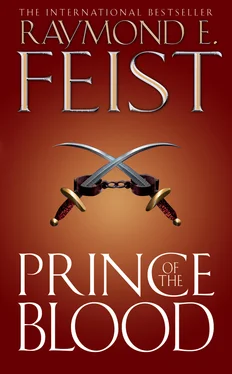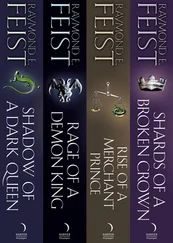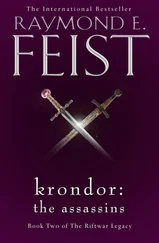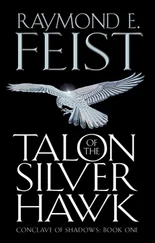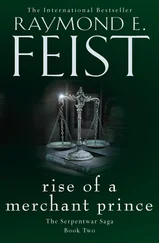RAYMOND E. FEIST
Prince of The Blood
Book One of Krondor’s Sons

HarperVoyager An Imprint of HarperCollins Publishers Ltd 1 London Bridge Street London SE1 9GF
www.harpervoyagerbooks.com
First published HarperCollins Science Fiction & Fantasy 1990
Copyright © Raymond E. Feist 1990, 2008
Cover Illustration © Nik Keevil
Raymond E. Feist asserts the moral right to be identified as the author of this work
A catalogue record for this book is available from the British Library
All rights reserved under International and Pan-American Copyright Conventions. By payment of the required fees, you have been granted the nonexclusive, nontransferable right to access and read the text of this ebook on screen. No part of this text may be reproduced, transmitted, downloaded, decompiled, reverse engineered, or stored in or introduced into any information storage and retrieval system, in any form or by any means, whether electronic or mechanical, now known or hereinafter invented, without the express written permission of HarperCollins e-books.
HarperCollins Publishers has made every reasonable effort to ensure that any picture content and written content in this ebook has been included or removed in accordance with the contractual and technological constraints in operation at the time of publication.
Source ISBN: 9780007176168
Ebook Edition © AUGUST 2012 ISBN: 9780007385355
Version: 2019–01–15
This book is dedicated
with love to my wife
Kathlyn Starbuck
who makes everything make sense
Cover
Title Page
Copyright
Dedication
Map
Chapter One: Homecoming
Chapter Two: Accusation
Chapter Three: Stardock
Chapter Four: Concerns
Chapter Five: Southward
Chapter Six: Dilemma
Chapter Seven: Captive
Chapter Eight: Escape
Chapter Nine: Welcome
Chapter Ten: Companion
Chapter Eleven: Hunting
Chapter Twelve: Evasion
Chapter Thirteen: Jubilee
Chapter Fourteen: Bargain
Chapter Fifteen: Snares
Chapter Sixteen: Stalking
Chapter Seventeen: Traps
Chapter Eighteen: Triumph
Continue the Adventure …
Afterword
Acknowledgments
About the Author
Also by the Author
About the Publisher
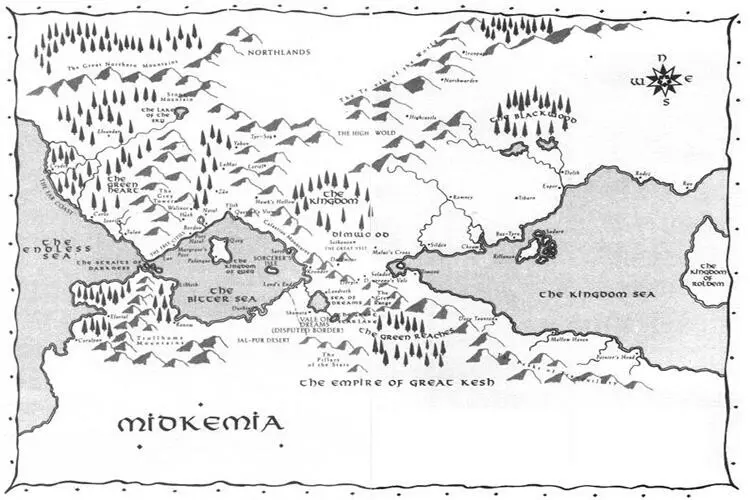
• CHAPTER ONE •
Homecoming
T HE INN WAS QUIET.
Walls darkened by years of fireplace soot drank in the lantern light, reflecting dim illumination. The dying fire in the hearth offered scant warmth and, from the demeanour of those who chose to sit before it, less cheer. In contrast to the mood of most establishments of its ilk, this inn was nearly sombre. In murky corners, men spoke in hushed tones, discussing things best not overheard by the uninvolved. A grunt of agreement to a whispered proposal, or a bitter laugh from a woman of negotiable virtue, were the only sounds to intrude upon the silence. The majority of the denizens of the inn, called The Sleeping Dockman, were closely watching the game.
The game was pokiir; common to the Empire of Great Kesh to the south and now replacing lin-lan and pashawa as the gambler’s choice in the inns and taverns of the Western Realm of the Kingdom. One player held his five cards before him, his eyes narrowed in concentration. An off-duty soldier, he kept alert for any sign of trouble in the room, and trouble was rapidly approaching. He made a display of studying his cards, while discreetly inspecting the five men who played at the table with him.
The first two on his left were rough men. Both were sunburned and the hands holding their cards were heavily callused; faded linen shirts and cotton trousers hung loosely on lank but muscular frames. Neither wore boots or even sandals, barefoot despite the cool night air, a certain sign they were sailors waiting for a new berth. Usually such men quickly lost their pay and were bound again for sea, but from the way they had bet all night, the soldier was certain they were working for the man who sat to the soldier’s right.
That man sat patiently, waiting to see if the soldier would match his bet or fold his cards, forfeiting his chance to buy up to three new cards. The soldier had seen his sort many times before; a rich merchant’s son, or a younger son of a minor noble, with too much time on his hands and too little sense. He was fashionably attired in the latest rage among the young men of Krondor, a short pair of breeches tucked into hose, allowing the pants legs above the calf to balloon out. A simple white shirt was embroidered with pearls and semiprecious stones, and the jacket was the new cutaway design, a rather garish yellow, with white and silver brocade at the wrists and collar. He was a typical dandy. And – from the look of the Rodezian slamanca hanging from the loose baldric across his shoulder – a dangerous man. It was a sword used only by a master or someone seeking a quick death. In the hands of an expert it was a fearsome weapon; in the hands of the inexperienced it was suicide.
The man had probably lost large sums of money before and now sought to recoup his previous losses by cheating at cards. One or the other of the sailors would win an occasional hand, but the soldier was certain this was planned to keep suspicion from falling upon the young dandy. The soldier sighed, as if troubled by what choice to make. The other two players waited patiently for him to make his play.
They were twin brothers, over six feet tall and fit in appearance. Both came to the table armed with rapiers: the choice of experts or fools. Since Prince Arutha had come to the throne of Krondor twenty years before, rapiers had become the choice of men who wore weapons as a consideration of fashion rather than survival. But these two didn’t look the type to sport weapons as decorative baubles. They were dressed as common mercenaries, just in from caravan duty from the look of them. Dust still clung to their tunic and leather vest, while their red-brown hair was lightly matted. Both needed a shave. Yet while their clothing was common and dirty, there was nothing that looked neglected about their armour or arms; they might not pause to bathe after weeks on a caravan, but they would take an hour to oil their leather and polish their steel. They looked genuine in their part, save for a feeling of vague familiarity which caused the soldier slight discomfort: both spoke with none of the rough speech common to mercenaries, but rather with the educated crispness of those used to spending their days in court, not fighting bandits. And they were young, little more than boys.
The brothers had commenced the game with glee, ordering tankard after tankard of ale, letting losses delight them as much as wins, but now that the stakes of the game were rising, they had become sombre. They glanced at each other from time to time, and the soldier was certain they shared silent communication the way twins often did.
The soldier shook his head. ‘Not me.’ He threw down his cards, one of them flipping completely over for an instant before it came to rest upon the table. ‘I’ve got duty in an hour; I’d best be back to the barracks.’
What he really knew was that trouble was imminent and if he were still around when it arrived, he’d never make muster. And the duty sergeant was a man not given to receiving excuses kindly.
Читать дальше
